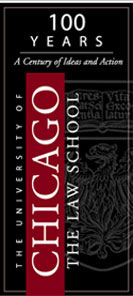|
I enrolled at the University of Chicago Law School almost by accident.
I
attended an undergraduate business school and in the early part
of my senior
year I accepted a job with a large automobile manufacturer as
an assistant
comptroller. I thought this was a good plan, but I never discussed
it with
my folks before I took the job. When I did get around to discussing
it, they
urged me to consider law school as an alternative - "after
all, it's a
useful education and you can always go into business". My
compromise was to
apply to a single law school - the University of Chicago - with
the
commitment that I would attend if accepted. As fate (at least
my fate) would
have it, I was accepted.
From the first day of classes, I jettisoned any notion that
I could give
anything less than a total commitment to my law school education.
Our class
was the first class in the new law school which seemed very high
tech then.
The Dean was Edward Levi, and while he may have been the brightest
star in
the faculty constellation, the other professors seemed awesome
to me:
Walter Blum, Bernie Meltzer, Brainard Currie, Harry Kalven, Malcolm
Sharp,
Frank Allen, Allison Dunham, Karl Llewellyn, et al - I can remeber
every one
of them to this day. They all taught classes and they all demanded
that we
think - individually and collectively. To me it was educational
boot camp.
I never really felt comfortable that I understood the big picture
- or the
little pictures for that matter. But I did know that for the first
time in
my education I was being challenged to think for myself and to
defend my
positions when called on to do so. It may not seem to be very
revolutionary
now, but for me it was a real eye opener about how much I had
to learn in
order to reach and defend a position.
Law school did not fly by for me. It sort of lurched from year
to year, but
as it ended, I had abandoned my idea about a business career;
I knew that I
wanted to tackle the intellectual rigors of a legal career. Back
then, law
students didn't expect to make significant earnings, that was
for doctors
and business people. But, believe it or not, being a lawyer was
then seen
as a respectable and fulfilling career. Interestingly, that perception
became a reality for me.
To fast forward from law school. I took a job in the Honors Program
with
the Antitrust Division of the Department of Justice in Washington.
It was a
wonderful time to practice there - perhaps because the judges
in the federal
court system tended to be activist and favor the government's
position. In
a little over two years, I worked on three civil trials (in court!)
and
handled a number a minor federal appeals for administrative agencies.
Without question, my experience at the law school provided me
with the tools
to successfully begin and continue my legal career. Whiile sometimes
intimidated by the scope of a matter or an issue, I have always
believed
that it has to be dealt with uncompromisingly, with no shortcuts
or
unwarranted assumptions. This, I believe, is a direct product
of my law
school education.
Law students at the University of Chicago, myself included, have
been very
fortunate. They have had access to the best minds and the best
education
they could hope for. I have no doubt that this will be true at
the time of
the next centennial as well.
Michael Freed (Class of 1962) |



